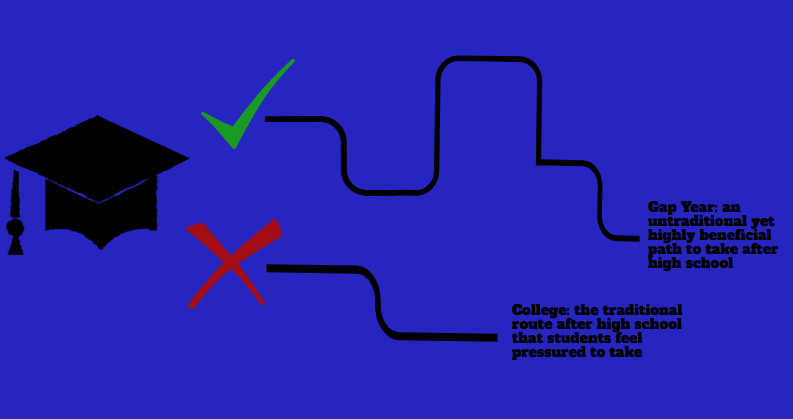Don’t Go to College
Gap years after high school are actually very beneficial for students and increase their focus, confidence, and life experience
Taking a gap year is a new way of learning after high school that offers students an alternative to stressing out about where to go to college.
The beginning of the second semester can be surreal for seniors in high school as the reality of graduation sets in. This can be overwhelming and exciting for several reasons, and while plenty of seniors are thrilled about moving on to their dream colleges and starting their new life, others are confused and lost about where to go or what to study next. Due to the stress and expectation of high school seniors having to go to college right after graduation, some students end up settling for a university that they don’t enjoy, like, or want to be at.
However, there are plenty of benefits to not going to college right after high school that can help students feel more confident in themselves and have a better idea of what they want to do next.
A gap year is beneficial for many reasons and can increase a student’s focus, confidence, and experience. In fact, each year, more and more students are considering taking a gap year in order to work, travel, or participate in invaluable internships that they couldn’t experience while at college.
“Now, more than 35 percent of high school students are thinking of taking a gap year, according to a recent survey by TD Ameritrade,” wrote Jessica Dickler, in her article on CNBC written on May 19, 2017.
This rise in taking a year off between high school and college is actually a positive trend for young adults these days. In The Coddling of the American Mind by Greg Lukianoff and Jonathan Haidt, they write that young people are growing up slower than the generation before them and reaching adult responsibilities later in life than their parents did. They use this logic to advocate for gap years: “There’s nothing intrinsically wrong with delaying adulthood, but if that’s happening, then shouldn’t we consider delaying the start of college, too?” and they go on to write, “We propose that Americans consider adopting a new national norm: taking a year off after high school…high school graduates can spend a year working and learning away from their parents, exploring their interests, developing interpersonal skills, and generally maturing before arriving on campus.”
Lukianoff and Haidt argue that gap years are beneficial since kids are less prepared than the generations before them to head off to college. Not to say that all seniors in high school aren’t mature or responsible enough to leave for college, but that overall they are less prepared than the generations before them simply due to the fact that adulthood has been delayed in our society.
Taking a gap year after high school is generally frowned upon because it is not the traditional road to take. However, the traditional way of learning is always changing. In fact, an article on Forbes by Jabez LeBret titled “Four Bold Predictions In K12 Education For The Next Decade” written on Jan. 1, 2020 details the innovations occurring in education.
For example, LeBret writes, “No longer will students be confined to memorizing facts but rather learning how to solve complex problems. We will see less focus on testing and ranking cohorts and more attention to individual contribution. Students will leave high school with a firm understanding of the unique contribution they can make in the world.”
This new way of learning is untraditional yet similar to what students can experience during a gap year. Instead of a conventional way of learning, gap years allow for students to have hands-on work experience and increase their problem-solving skills so that when they do return to a traditional classroom setting at college, they will have more life experiences and abilities to tackle their assignments and projects.
In fact, “students who take a gap year tend to be more academically focused,” said Danny Ruderman, a college counselor in Los Angeles in Dickler’s article on CNBC.
While taking a gap year may sound a bit “taboo” to most high school seniors, the time off between high school and college is nothing to be ashamed of. Research suggests that students need extra time before they venture off to live on a college campus and that the time spent between high school and college can be extremely beneficial for students to find unique experiences and life lessons.
So, if you’re freaking out about what college to go to next year, consider the possibility of taking a gap year.




